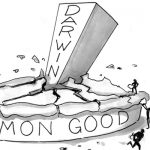By Jag Bhalla
1. Recent Evonomics sparring (here—here) reveals paradigm-cracking logic… which Michael Shermer’s debate with Robert Frank mishandles.
2. The crux—how can individual and group incentives and goals interact?
3. One possibility is the always-sunny “spontaneous order” story, selfish individuals + markets = collectively good.
4. Frank shows Darwin described another possibility—>self-organizing patterns where individual incentives create or worsen collective woes (these “Darwin’s Wedges” harm each and all).
Get Evonomics in your inbox
5. Darwin’s self-organizing “economy of nature” teems with individual vs collective incentive problems (e.g. Richard Dawkins calls tree trunks “standing monuments to futile competition”).
6. Why would economic self-organization differ? What guarantees collective goodness? (see Frank’s counterexamples, + “Markets Dumb As Trees”)
7. Shermer recognizes bad incentive combinations in sports—>bike helmets = competitive disadvantage = few will incur, unless all must. What prevents market game equivalents?
8. Two market ideas often held sacred have been compared to Ptolemy-like sacred-circular faiths; a) individuals self-optimize, b) markets aggregate beneficially.
9. Ptolemy believed heavenly motion had to be circular, so he used faith-preserving epicycles to cover evident deviations (actually helio-focal ellipses).
10. Jason Collins calls evident deviations from individual-optimization (epicycle-like cognitive biases) “165 deviations from the wrong model.”.
11. Evident deviations from beneficial aggregates are deemed distorted “market failures.” And loose epicycle analogies have been made (e.g. by Steve Keen, “unlearningeconomics” blog).
12. Tellingly, Shermer miscategorizes Darwin’s Wedges as “market failures.” They’re not. Or they’re a different kind—everybody individually optimizes but it’s still collectively counterproductive. And would be even under perfect prices, information, rationality etc.
13. Market outcomes don’t revolve around the sunny-self-organization faith beloved in libertarian circles. Epicycle-like elaborations can’t overcome the core logic error.
14. Without ways to recognize and handle collectively bad self-building patterns, free-markets are undercover utopias (Ptolemy-sized “monumental mistakes”).
15. Plus self-building bad patterns (spontaneous malorders) usually resist voluntary fixes—>sellers and buyers both “gain” by ignoring pollution costs (which Diane Coyle chastises economists for “shrugging.. collective shoulders” about). As with bike-racer helmets, only collective restrictions can realign incentives.
16. A belated “empirical revolution” is sweeping economics, spotlighting “101ism’s” frequent failures. But ignoring self-organization’s Manichean dark side systematically mishandles Adam Smith’s “invisible hand.”
17. To be crystal clear: individual incentives don’t always combine for collective good.
2016 May 3
Donating = Changing Economics. And Changing the World.
Evonomics is free, it’s a labor of love, and it's an expense. We spend hundreds of hours and lots of dollars each month creating, curating, and promoting content that drives the next evolution of economics. If you're like us — if you think there’s a key leverage point here for making the world a better place — please consider donating. We’ll use your donation to deliver even more game-changing content, and to spread the word about that content to influential thinkers far and wide.
MONTHLY DONATION
$3 / month
$7 / month
$10 / month
$25 / month
You can also become a one-time patron with a single donation in any amount.
If you liked this article, you'll also like these other Evonomics articles...
BE INVOLVED
We welcome you to take part in the next evolution of economics. Sign up now to be kept in the loop!























